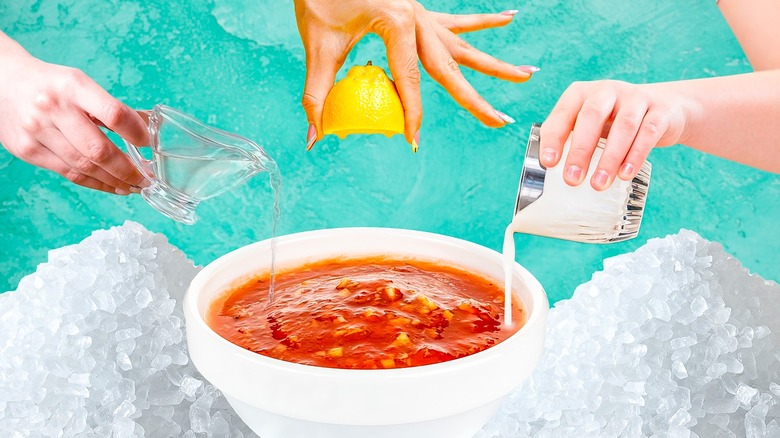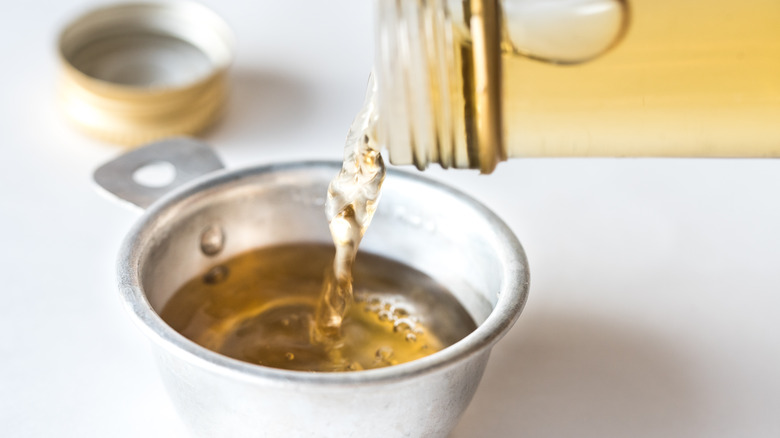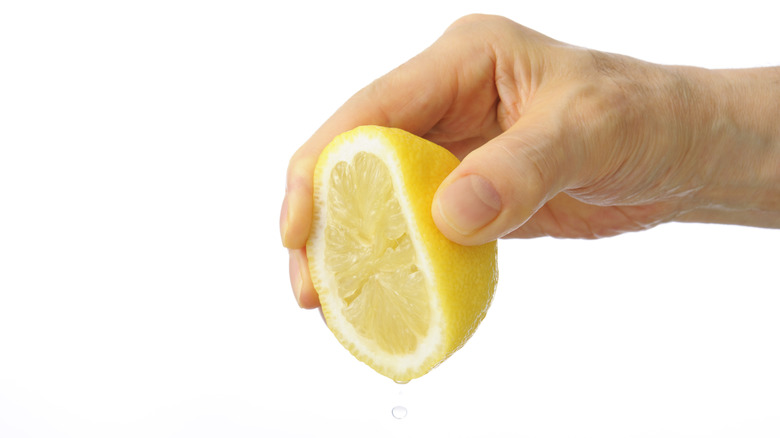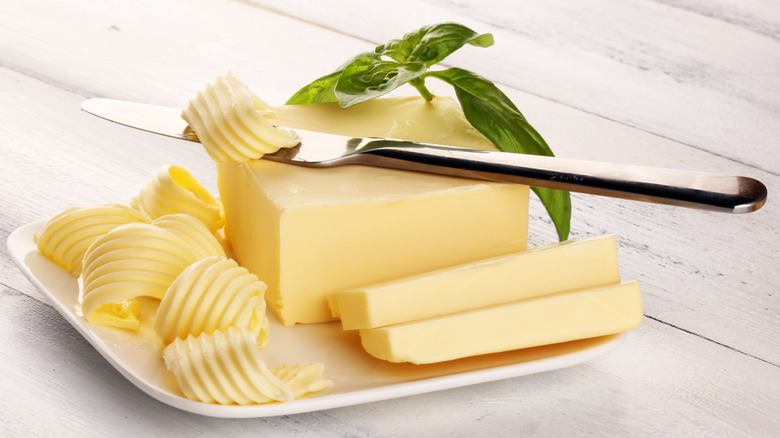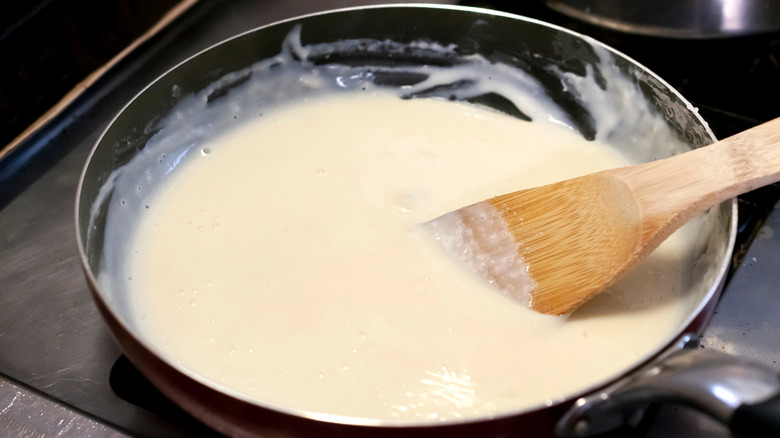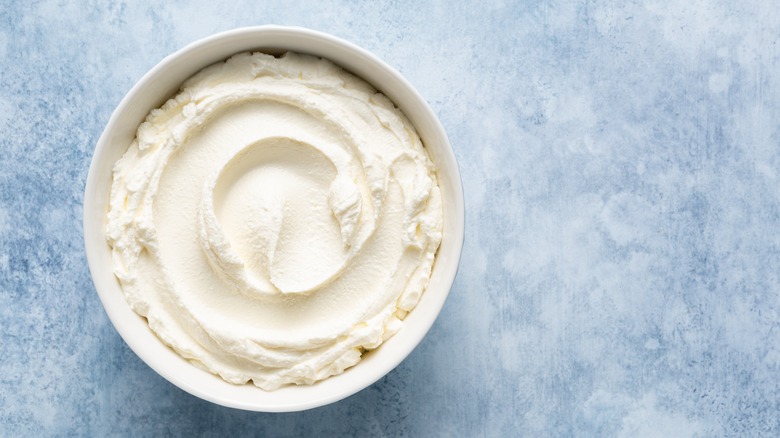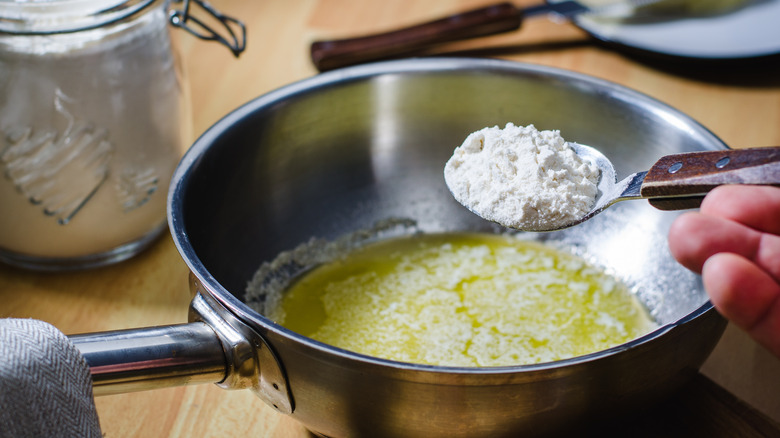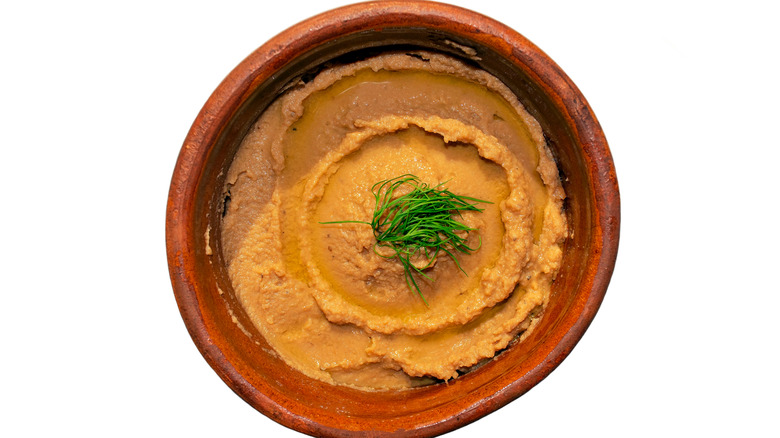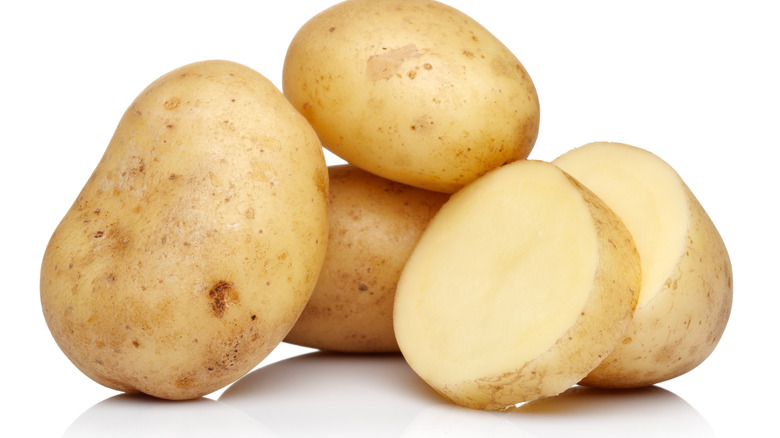11 Ways To Fix Oversalted Sauces
Maybe you can imagine this familiar scene — you've spent hours lovingly preparing a meal, meticulously combining the ingredients to create a masterpiece. As soon as you take the first taste, your enthusiasm fades into disappointment. The sauce that was meant to elevate your dish has betrayed you. The savory aroma and perfectly balanced flavors you pictured have given way to a harsh, briny assault on your taste buds. Frustration sets in as you consider the prospect of starting over or, even worse, settling for a bland meal.
The good news is that we've all been there, and there's no need to throw in the culinary towel just yet. We'll explore ways to fix over-salted sauces so you can rescue your dishes from the brink of flavor disaster. Some tips, like adding a splash of vinegar or a teaspoon of sugar, will seem obvious, while others, like incorporating puréed beans, will test your cooking knowledge. Together, this arsenal of techniques is sure to restore balance to your sauces, turning a potential disaster into a tasty triumph.
Add a splash of vinegar
When it comes to fixing over-salted sauces, vinegar emerges as one of the most effective methods, especially in light, herb-based sauces like chimichurri. This culinary trick leverages the principle of contrast and balance. To put it another way, vinegar's pronounced sourness and acidity distract the taste buds, thereby reducing the perception of saltiness as you eat. But vinegar doesn't just counterbalance the salt, it elevates the overall taste of your sauce by infusing it with an invigorating tang. The result is a more complex and well-rounded flavor profile sure to wake up your palate from its salty stupor.
Although vinegar is well-suited for cutting through saltiness, it's important to use it in moderation. Add too much and you'll have a whole new problem on your hands — a mouth-puckeringly sour sauce. It's also important to choose the right type of vinegar. Depending on what you're making, a strong-tasting vinegar like rice or balsamic will add funky, unwanted flavor notes. Instead, opt for a neutral-tasting variety like white wine or apple cider vinegar.
Squeeze in some citrus
Citrus, whether it's zesty lemon juice, vibrant lime juice, or sweet-tart orange juice has a knack for balancing out salty sauces. The secret lies in the acidity of these fruits, something that comes from their high citric acid content. When introduced to sauces, citrus slices through the monotonous saltiness, resulting in a well-rounded flavor profile. On top of that, citrus provides another layer of flavor, the result of which is a more complex sauce.
Beyond its prowess in rescuing overly salty sauces, citrus boasts incredible versatility. To put it another way, it's a culinary lifesaver, no matter what you're whipping up in the kitchen. For example, the neutral nature of lemon effortlessly melds into a wide array of recipes, from creamy country gravy to tartar sauce. Meanwhile, lime shines in Mexican and Asian cuisine, playing a pivotal role in restoring balance and injecting brightness into sauces like red enchilada sauce and spicy peanut sauce. Orange, with its characteristic sweet notes, has a more limited profile, but try using it if your orange chicken sauce ends up too salty.
Stir in sugar
While culinary opposites may not neatly align on a color wheel, there's no denying that salt and sugar represent two distinct ends of the flavor spectrum. Still, for all of their differences, these flavors pair well together. Just look at the delightful marriage of flavors in salted caramel sauce or sea salt brownies. It's this flavor synergy that makes adding sugar to an over-salted sauce a common and effective remedy.
When it comes to the best sweeteners for rescuing over-salted sauces, four options stand out: white sugar, brown sugar, honey, and maple syrup. White sugar is a subtle savior, ideal for taming the saltiness in tomato, cream, or butter-based sauces. That's because its neutral profile won't overpower the sauce's more delicate flavors. When you're dealing with darker sauces like barbecue or chili, the rich, caramel notes of brown sugar add depth to the final product. For all other sauce types, experiment with the natural sweetness of maple syrup or honey. They not only balance the saltiness but also infuse sauces with unique and enticing flavor notes. Once you've selected your sweetener, mix in just a bit at a time, tasting after each addition. This process can be a bit tedious, but it helps ensure that your overly salty sauce doesn't become an overly sweet one.
Fix it with fat
For those who don't mind some extra butter in their meal, allow us to introduce the fix-it-with-fat method. This technique involves introducing a pat of unsalted butter or a drizzle of olive oil into the sauce in order to tame excessive saltiness (be very careful to not use salted butter, as it'll defeat the entire purpose).
This culinary trick is effective for several reasons. First, it relies on the straightforward principle of dilution. When you incorporate butter or oil into your sauce, you increase its overall volume, effectively reducing the salt concentration and making it more palatable. Additionally, the presence of fat serves as a buffer, coating your taste buds and reducing the perception of saltiness. Furthermore, fats introduce a creamy texture to sauces, something which counteracts the harshness of the salt. Lastly, fats contribute their own unique flavors to the final product, helping to balance out excessive saltiness.
Dilute the sauce with water or unseasoned stock
One of the most straightforward remedies for an overly salty sauce involves introducing water or unseasoned stock into your creation. This technique operates on the principle of dilution. As you incorporate more liquid into your sauce, the concentration of salt diminishes, making it more palatable. Much like the other methods we've explored in this article, we recommend a gradual approach: start with a small quantity of water or stock, taste the results, and continue until the sauce is to your liking.
In terms of choices, water stands out for its neutrality and versatility. Basically, it will reduce saltiness without altering the essential taste of your sauce. Meanwhile, unseasoned stock, be it chicken, vegetable, or beef, contributes subtle savory nuances that enhance the sauce while simultaneously curbing excessive salt. When diluting, consider the sauce's consistency. If it becomes excessively thin, add more solid ingredients. A thickening agent like a slurry (a mixture of water and cornstarch) or a beurre manié (a blend of equal parts butter and flour) is all you need to fix the issue.
Combine it with a complimentary sauce
This trick requires a bit of extra work, but it's well worth the effort. By combining the too-salty sauce with a less-salty counterpart, whether it's the same sauce or one that complements it, you can effectively bring the saltiness down to a palatable level. The benefit of this method is that it allows you to fine-tune the saltiness to your liking. You can experiment with different ratios, gradually blending the sauces until you find the perfect balance.
And not only does this method promise to save your sauce, but it also opens the door to creativity, allowing you to experiment with novel combinations. Who knows? You might just end up with a new favorite flavor combination. When considering sauce pairings, think about complementary flavors and cuisines. For example, you could try toning down salty teriyaki sauce with liquid aminos or desalinating curry with coconut sauce. Or, if you want to keep things simple, make a salt-free batch of your favorite pasta sauce and blend until your taste buds sing.
Use dairy products
Just as dairy products can be used to tame acidic flavors in tomato sauce, they can also come to the rescue when you've gone a bit overboard with the salt. There are a few key reasons why this kitchen trick works like a charm. The first is that dairy products like heavy cream, crème fraîche, and sour cream coat the taste buds, helping to cut down the perception of saltiness as you eat. Secondly, they contain naturally occurring sugars, something that makes the salty notes less intense. A third reason is that the additional liquid they provide helps dilute the sauce, making the salty notes less overpowering.
While this trick is pretty amazing, there are some caveats to be aware of. For starters, not all dairy ingredients are created equal. If you add something that's already salty, like Parmesan or cottage cheese, you'll undermine all of your de-salting efforts. With that in mind, stick with dairy options that are lower in salt. Also, be aware that this method may not work for every type of sauce. While heavy cream might be a match made in heaven for tomato sauce, it spells trouble for delicate sauces like demi-glace or velouté. There's no one-size-fits-all rule, so trust your instincts when selecting which sauces to rescue with dairy.
Make a roux
Don't be intimidated by the fancy French name — a roux is simply a mix of butter and flour in equal parts. To make a roux, begin by melting the butter in a pan over medium heat, gradually incorporating the flour until a paste forms. Continue whisking until the roux attains your desired hue, which can range from white to dark brown. Once it's ready, introduce the paste into your sauce and stir to combine.
There are a few ways a roux helps de-salinate sauces, all of which will be familiar if you've been paying attention. The first is through the process of dilution. By adding a roux to a sauce, you introduce a starchy element (the flour) that lessens the overall salt concentration. Second, the roux plays a crucial role as a thickening and smoothing agent. This helps ensure an even distribution of flavors, effectively tempering any pronounced saltiness in specific areas of the sauce. Additionally, a roux is bland, something which serves to reduce the intensity of saltiness.
As you might expect, this method works best for thick sauces like gravy or cream. It's also worth mentioning that the roux will thicken your sauce. If it's too thick for your liking, thin it out with water or unsalted broth.
Puréed beans might do the trick
If your sauce has wandered into the treacherous territory of excessive saltiness, there's a surprising yet effective solution — introducing some velvety puréed beans. While it may seem unconventional to incorporate semi-solid food into what should be a liquid concoction, these humble legumes possess a remarkable talent for absorbing and taming unwanted saltiness.
There are plenty of bean types out there, so a thoughtful match with the color and character of your sauce is essential. For instance, white varieties like Great Northern or Cannellini seamlessly blend with cream-based sauces, while red or kidney beans come to the rescue in tomato-based creations. Regardless of your choice, it's crucial to select low-sodium or no-salt-added beans, ensuring you don't inadvertently amplify the salt issue. It's also a smart idea to give the beans a thorough rinse beforehand. The next phase of your culinary rescue mission involves puréeing one cup of beans with a splash of water until you've got a smooth paste. Gradually incorporate the mixture into your sauce, introducing it in quarter-cup increments as needed. When you're done, you'll have a balanced sauce with an irresistibly smooth texture.
Incorporate some wine
It's no secret that cooking with wine can yield some incredible results. Not only can it be used to marinate meat and create velvety brownies, but it works wonders in reducing the saltiness of sauces. There are a number of ways it does this, all of which relate back to principles we've already discussed. First and foremost, wine saves sauces through dilution. Much like the addition of water or stock, wine contributes volume to your sauce, effectively reducing the overall salt concentration in each spoonful.
Additionally, like citrus and vinegar, wine (particularly white wine) imparts an acidic dimension to the sauce, enriching its flavor profile and toning down its saltiness. Another way vino comes to the rescue is through residual sugar. Sugar is particularly prominent in dessert wines, such as Sauternes and sweet Rieslings. It acts as a sweet counterpart to the saltiness. As you can see, there's no end to the ways wine can be used in your next sauce. Perhaps the only thing to be aware of is that you'll have to simmer sauces longer than the recipe calls for. This ensures that all of the alcohol gets cooked off. Fail to do so and your sauce will take on unpalatable bitter notes.
Experiment with raw potato
There's some debate as to whether this trick actually works, but if all else fails, it's worth a shot. This method involves adding diced raw potato into a simmering sauce. The idea behind this approach lies in the starch content of the potato. Just as puréed beans or a roux contain this carbohydrate, so do potatoes. Essentially, the thinking is that starches act like sponges, absorbing both excess liquid and drawing salt out of your sauce.
While this theory sounds promising, it's important to acknowledge its limitations. In practice, it's often the additional water or other liquids you need to add as the potato absorbs moisture that contributes more significantly to the salt reduction. Besides that, you also need to be careful when employing this method as potatoes can inadvertently alter the sauce's texture. Prolonged cooking times can result in mushy spuds, turning your once picture-worthy sauce into an eyesore.
